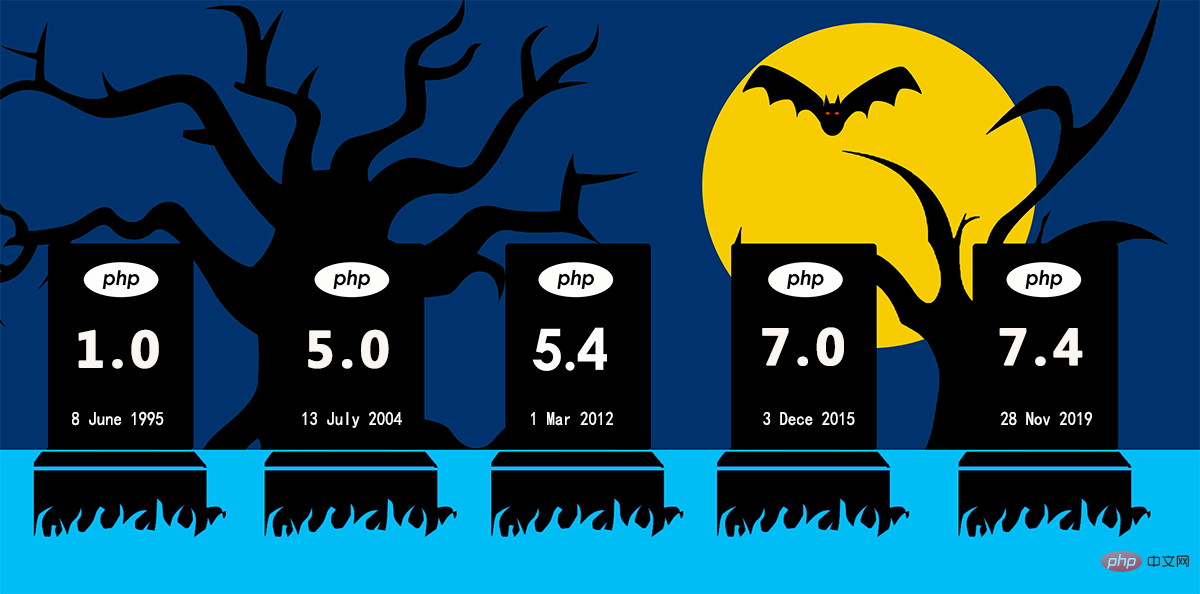PHP has always existed as the dominant force in Web development. In the field of WEB server development, the global share has always remained above 78%.
PHP is fast, very powerful, ecologically sound, and free. It is a programming language born for the WEB. Since its birth, PHP has been called the best programming language in the world by most developers. .

As a PHP learner and developer, how can I not understand its history?
The following php Chinese website will lead php enthusiasts to review the various historical versions of php.
php version development history:
| Version | Release date | Final support | Related updates and notes |
|---|---|---|---|
| 1.0 | 1995-06-08 | -- | First use |
| 2.0 | 1997- 11-01 | -- | PHP first release |
| 1998-06-06 | 2000-10-20 | Zeev Suraski and Andi Gutmans rewrote the underlying | |
| 2000-05-22 | 2001-06-23 | Added Zend engine | |
| 2001-12-10 | 2002-03 -12 | Added superglobal (the concept of super global, namely $_GET, $_POST, etc.) | |
| 2002-04-22 | 2002-09-06 | register_globals is disabled by default | |
| 2002-12-27 | 2005 -03-31 | Introduced the command line interface CLI to use without CGI | |
| 2004-07-11 | 2008-08-07 | Fixed some fatal errors | |
| 2004-07-13 | 2005-09- 05 | ZendⅡEngine | |
| 2005-11-24 | 2006-08-24 | A compiler was introduced to improve performance and PDO was added as an interface to access the database | |
| 2006-11-02 | 2011-01- 06 | Filter extension enabled by default | |
| 2009-06-30 | 2014-08-14 | Support namespaces; use XMLReader and XMLWriter to enhance XML support; support SOAP, delayed static binding, jump tags (limited goto), closures, Native PHP archives. | |
| 2012-03-01 | 2015-09-03 | Supports Traits and short array expressions. Removed register_globals, safe_mode, allow_call_time_pass_reference, session_register(), session_unregister(), magic_quotes and session_is_registered(). Added built-in web server. Improved performance and reduced memory usage. | |
| 5.5 | 2013-06-20 | 2016-07-10 | Support generators, finally for exception handling , Add OpCache (based on Zend Optimizer) to the official release. |
| 5.6 | 2014-08-28 | 2018-12-31 | Constant scalar expression, variable parameter function , parameter unpacking, new exponentiation operator, extension of use statement for functions and constants, new phpdbg debugger as SAPI module, and other smaller improvements |
| 6. x | Unreleased | -- | A canceled PHP version that has never been officially released. |
| 7.0 | 2015-12-03 | 2018-12-03 | Zend Engine 3 (Performance improvements and on Windows supports 64-bit integers), unified variable syntax, and abstract syntax tree based compilation process. |
| 7.1 | 2016-12-01 | 2019-12-01 | void return value type, class constant, visible Sexual modifiers |
| 7.2 | 2017-11-30 | 2020-11-30 | Object parameter and return type hints , abstract method rewriting, etc. |
| 7.3 | 2018-12-06 | 2021-12-06 | PCRE2 support, etc. |
| 7.4 | 2019-11-28 | 2022-11-28 | Improve OpenSSL, weak references, etc. |
| 8.0 |
2020 S4
or
2021 S1
|
2023 S4
or
2024 S1
|
JIT, array negative index, etc. |
As of 2020, PHP has been born for 27 years. PHP versions and functions have been updated and developed. The number of requests processed by PHP 7.4 per second is three times that of PHP 5.6, which is about 18% faster than PHP 7.0; PHP 8.0 New featuresJIT (just-in-time) compilerAnd so on, this may open the door to machine learning, 3D rendering and data analysis on the web server, the future is endlessly imaginable...
The last and most important point is that according to w3c statistics, PHP's share of server-side programming languages for websites is still close to 79%, and there is no further decline. In this regard, the community can act with healthy self-confidence without having to Avoid comparisons with other languages.
As for questions like “Does PHP have a future?”, “Is it still worth learning PHP?”, “Is PHP losing importance?” or even “PHP is dying” that pop up every year, I guess There is no point in arguing anymore. If you want to learn, start now!
Free learning recommendations: php language introductory tutorial (PHP programming learning roadmap)
Related recommendations:
1. Did you know? The best language of all: PHP is 25 years old!
2. Why is PHP the most suitable programming language for novices?
3. My sad road to job hunting: If you can, learn PHP, don’t do Python
4. PHP’s global share in 2019 How much does it account for? A survey from W3Techs
 Tutorial on buying and selling Bitcoin on Huobi.com
Tutorial on buying and selling Bitcoin on Huobi.com
 How to turn on vt
How to turn on vt
 How to convert excel to vcf
How to convert excel to vcf
 How to check dead links on your website
How to check dead links on your website
 How to change file type in win7
How to change file type in win7
 What is the difference between JD International self-operated and JD self-operated
What is the difference between JD International self-operated and JD self-operated
 The role of linux terminal commands
The role of linux terminal commands
 How to write triangle in css
How to write triangle in css